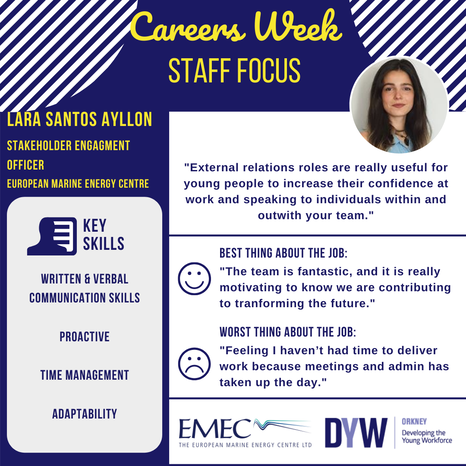 EMEC's next Staff Focus is Lara Santos Ayllon, who works as Stakeholder Engagement Officer at EMEC in Stromness. Lara graduated with a degree in Politics, Philosophy and Economics and originally wanted to work in the political and activism sectors. However, her first role was an internship in a Communications and Public Relations agency which she saw as a chance to gain transferrable skills and learn more about the sector. This role helped her realise she wanted to change career direction into the energy and climate change arena and she undertook a Masters Degree in Energy, Society and Sustainability where she learnt about EMEC. When an opportunity came to work at EMEC, she applied straight away.  Can you describe a typical day in your job? On a day to day, my role usually includes internal and external meetings with individuals across industries and roles, to create connections and networks. Daily, it also usually includes reading through relevant policy strategies and other official documents, analysing these to map out the policy actions relevant to our organisation. Another part of my role is delivering on engagement opportunities, for example, creating content online for local communications, or responding to government consultations. How did you end up in this role? I studied an undergraduate degree in Politics, Philosophy and Economics, and following months of job search in the political and activism sectors, I instead found an internship at a communications and public relations agency. I took the internship as an opportunity to learn the ins and outs of a sector, as well as the transferable skills that came with it! I also saw value in learning the dynamics of a full time, nine-to-five job, which I had never experienced before. During this time, I realised I wanted to direct my career towards the energy and climate change arena. Given I personally have an affinity for academia, I decided to look for a Masters degree. Following a year of work in communications, I moved to Edinburgh to study an MSc in Energy, Society and Sustainability. Given my social sciences background, I was afraid that without technical knowledge I would be unable to work in the industry I was passionate about. To my surprise this Postgraduate Degree introduced me to technical content from a generalist perspective, focusing on the dynamics between the social, the political, the environmental and the technical, and how we need to consider them all together to respond to climate change. I learnt about Orkney and EMEC during the MSc, in a module on local energy system and community innovation. When an opportunity arose to join the EMEC team I applied straight away. I am now working in the industry I care about, in a role which matches my skills and interests, with a great team. At the same time, I am constantly challenged to continue to learn about and understand the technical dimensions of climate, energy and environment, all in all it is a really great dynamic. What is the best thing about your job? In practical terms, the best thing about my job is seeing a tangible impact from efforts into political consultations, for instance, or into engagement campaigns. Moreover, through this process I am constantly learning about the local, regional and national policy landscapes and initiatives in relation to energy, climate change and innovation and internationally too. The team is fantastic, and it is really motivating to work with the shared knowledge that we are contributing our grain of sand into hopefully, transforming the future for the better. What is the worst thing about your job? There are days where I feel I haven’t had time to deliver work because meetings and admin has taken up the day. What skills do you need to undertake your role? Oral and written communications skills. Flexibility working across teams and sectors. Proactivity. Time management. Adaptability. What qualifications do you have? Undergraduate Degree: BA in Combined Honours in Social Sciences: Politics, Philosophy and Economics Postgraduate Degree: MSc in Energy, Society and Sustainability Would you recommend this job to young people, if so why? Yes – absolutely. My role is in fact, a graduate scheme role. A role in external relations/ stakeholder engagement enables you to learn a vast amount about a particular industry. You will be in touch with policy across the sector at national and international levels, while also gaining knowledge on the trade bodies, and key businesses working in each space. The role is generalist, meaning it is not specialised in a particular niche. This has pros and cons, and ultimately boils down to different people’s skills and desired career paths. A particular benefit of this type of role is that it teaches strategic thinking, learning to see the full picture of situations. External relations roles are also really useful for young people to increase their confidence at work and speaking with individuals within and beyond their teams. Visit EMEC on: Website: www.emec.org.uk Facebook: www.facebook.com/EuropeanMarineEnergyCentre Twitter: www.twitter.com/EMEC_Ltd Comments are closed.
|
Archives
June 2024
Categories
All
|
 RSS Feed
RSS Feed